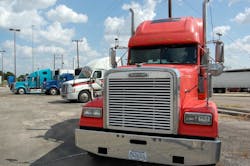A sobering thought on trucking and the “work ethic”
Yet the seventh item on Stifel’s list is what really caught my eye, largely because it touched on a fundamental change to what one could call the traditional “work ethic” of the U.S. labor force.
Now I noted in an earlier post this week the mindset of “Generation Y” or the “Millennials” now rising to the fore in our work force – they’ll comprise 75% of it by 2025 – is manifestly different in many ways than the generation it’s replacing, but in the eyes of Stifel’s analysts, this is a handover tinged with negative consequences:
The “Greatest Generation” is nearly a memory. Americans with a deep-seated, focused work ethic are few and far between. Many seem unwilling to endure short-term pain for long-term gain. Couples are waiting to get married, if they marry at all, and wait even longer to have children, if any at all. The slowdown in the rate of household formation and all the attendant consumption continues as societal priorities change and as the government adopts policies that discourage hard work, success, innovation, creativity, job creation, and investment in favor of income redistribution and other social policies. Equal opportunity has been replaced by equal outcome as an objective for so many that “American Exceptionalism” in the private sector is at risk.
Stifel’s headline for that “game changer” by the way reads like this: “Demographic trends and the decline of ‘American Exceptionalism’ further depresses economic growth and freight volumes.”
So a couple of opposing thoughts came to my mind specifically about the truck driver profession after reading the above passage.
On the one hand, is it any wonder that many new drivers are “unwilling” to endure “short term pain” when it comes to the pay and working conditions of the long haul profession where most new drivers must start? I’ve noted in this space before that not only is the pay relatively low compared to the demands of the jobs, drivers continue to be treated like second-class citizens at almost every point in the supply chain they serve.
Then there are the many regulatory initiatives fostering all sorts of change to the ways truck drivers manage their work day – not all of them positive.
Indeed, many such issues were address during the annual State of Logistics presentation back in June of last year; noting that truck drivers represent a job category with the fewest potential workers trained to fill them with only about 17% of the current driver population under age 35 and a far larger portion of the driver population reaching retirement age.
Todd Spencer, executive VP for the Owner-Operator Independent Driver Association (OOIDA), touched on similar themes as well during a conference call sponsored by Stifel last May.Yet there’s another side to this as well, one I talked about a few years back with Mercer Transportation’s Dale Corum.
Dale told me that many young drivers with just a few years of experience would come into Mercer’s lot and see all these premium trim level sleeper tractors and hear stories about owner-operators taking a month off from work to go on vacation and would say to him, in essence, “Yep, this is for me. Now where’s my truck?”
“What these young guys didn’t get is those owner-operators with the fanciest sleepers who could afford to take a month off had worked 14 years or more to get there,” he explained. “They’d put in years of work cultivating customers, delivering on time, and saving their money to end up with all of that. A lot of the young guys just expect to start right at that level. That’s just not how it works.”
Indeed, regardless of the career path, workers are usually expected to prove themselves worthy of their jobs with their performance over time engendering pay raises, promotions, etc.
Yet is that “work ethic” tenet of the U.S. labor pool disappearing? A single statement by a Wall Street investment firm doesn’t make it so, of course, but it’s an issue nonetheless worth considering by trucking.
Because at the end of the day, driving a truck for a living – much less all the other jobs tied to it, such as dispatching, load planning, repair and maintenance, etc. – requires dedication, skill, a focus on safety, and the capacity to stay sharp no matter how empty the highway ahead may seem, for an 80,000 lbs. big rig doesn’t stop on a dime and can cause untold havoc in a crash if not handled properly. Can the next generation adequately discharge that responsibility? We’re going to find out one way or another.


